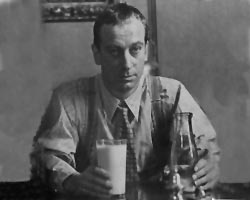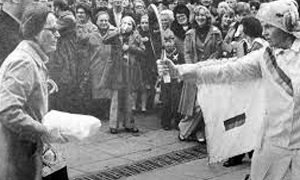 In 1941, in a remote country house near Wendelsham, somewhere in southern England, nineteen-year-old upper class girl Anna Seaton (Kate Nelligan) arrives to start work as a translator of radio propaganda broadcasts aimed at breaking German spirit. Other staff at the stately home include upper class officer Will Langley, down-to-earth secretary Eileen Graham (Brenda Fricker) and, taking charge of the content, Glaswegian ex-journalist turned pretend Nazi Archie MacLean (Bill Patterson), who has a class-related chip on his shoulder a mile wide, an immense amount of ambition, a worrying fascination with Goebbels, and a chronic drink problem.
In 1941, in a remote country house near Wendelsham, somewhere in southern England, nineteen-year-old upper class girl Anna Seaton (Kate Nelligan) arrives to start work as a translator of radio propaganda broadcasts aimed at breaking German spirit. Other staff at the stately home include upper class officer Will Langley, down-to-earth secretary Eileen Graham (Brenda Fricker) and, taking charge of the content, Glaswegian ex-journalist turned pretend Nazi Archie MacLean (Bill Patterson), who has a class-related chip on his shoulder a mile wide, an immense amount of ambition, a worrying fascination with Goebbels, and a chronic drink problem.
Inevitably drawn to the well-bred, under-age Anna, he bursts drunkenly into her room on the first night, but collapses out cold before anything happens – the next day refusing to acknowledge the incident. As the broadcasts, read out by two Germans (one a dissident, one from a nearby internment camp) sitting at microphones at opposite ends of a billiard table, progress (along with the war, and the start of the Russian campaign) Anna’s fascination for Archie overcomes her fear and repulsion, and in an amazingly tense and terse scene, they make ‘love’ (‘The Scot makes love wi’ a broken bottle an a great deal o’ screamin’!’) Tending to the resulting bruises the next day, she remains tight-lipped, and clearly, innocently in awe of this bit of Clydeside rough. But, having conquered, Archie shows no further interest in her, and a few stilted weeks’ worth of non-dialogue later, Langley summarily dismisses Anna for, in Archie’s words, trying (‘unsuccessfully’) to sleep with him. Anna can’t believe it (‘It’s not true!’ ‘I don’t care if it’s true – you’ve unbalanced one of our most gifted writers. That is unforgivable.’) Propaganda has come home to roost.The same night, in the final German broadcast, Archie gets to live out a fantasy of the ‘proper’ warfare he claims he’d rather be doing by staging – with relish – a mock assassination of one of the broadcasters.
A BAFTA winner, and rightly so, this is a deceptively simple film from David Hare (who also directed) – a cross-class, cross-age anti-romance to which only wartime circumstances could give rise, filled with detail of the period that’s a step up from being mere ’period detail’ – the dinner scene, where a gong is sounded and the staff sit around a grand table to be served up powdered mash and luncheon meat, ’carved’ by Archie, is amusing, but also points up MacLean’s assumed position at the head of a new hierarchy every bit as stifling as the one observed by the country house’s recently-vacated occupants. Anna, initially unable to even make a cup of tea (but taken under the wing of the mumsy Eileen, who later has to leave when news of her brother’s death comes through) is right at the bottom, an unworldly posh girl in a hermetic macho microcosm of the war, tragically unable through her upbringing to manage to raise a voice of opposition until it’s too late. Nelligan’s frightened, minimal performance in this role is a match for Patterson’s more meaty, shouty turn, equal parts hateful disillusion and solid determination, but Hare gets the goods from every cast member.
Firmly past his ’Marxist’ origins, Hare makes sure there are no easy moral lessons glibly flung out of the screen here, and as a result the political and social commentary seeps into the personal story rather than sitting flatly on top, ’like basking sharks’ as Dennis Potter once (unfairly) remarked when reviewing Trevor Griffiths’s All Good Men (qv). One tiny quibble is the final montage, a documentary-style ‘where are they now?’ look at how the protagonists’ lives panned out – Archie made sentimental films about the Glasgow tenements before going to Hollywood, Anna went into advertising, got married, divorced, slept around in the ‘60s and retreated to rural Wales. It breaks the hermetic world of the wartime country house, and although it does give her the last word, after years of experience, in a letter to Archie, it still seems slightly tacked-on. But this is only a tiny drop in the extremely high standards of the rest of the play, which is easily one of the best examples of non-polemical political drama in the entire Play for Today strand.





















